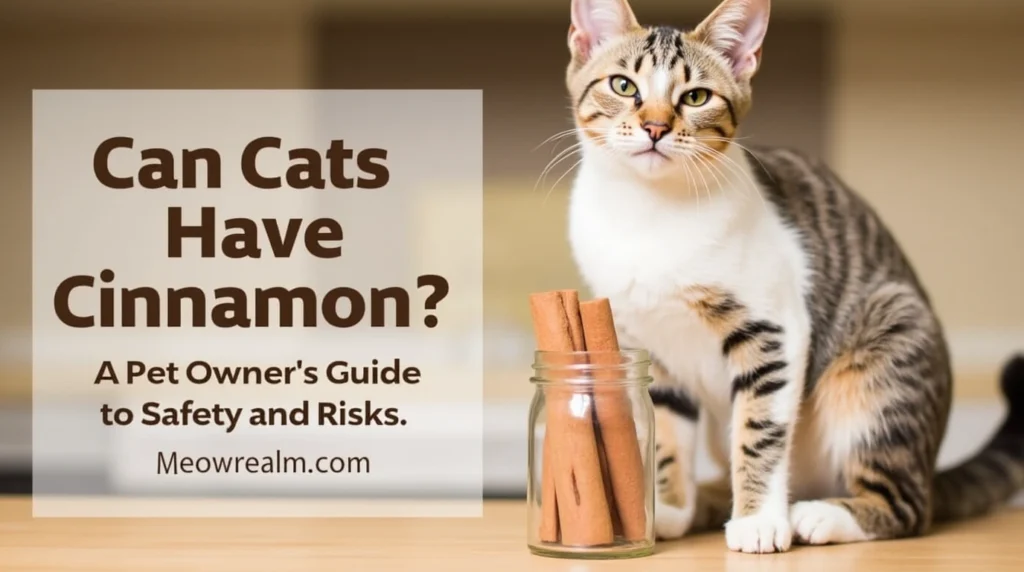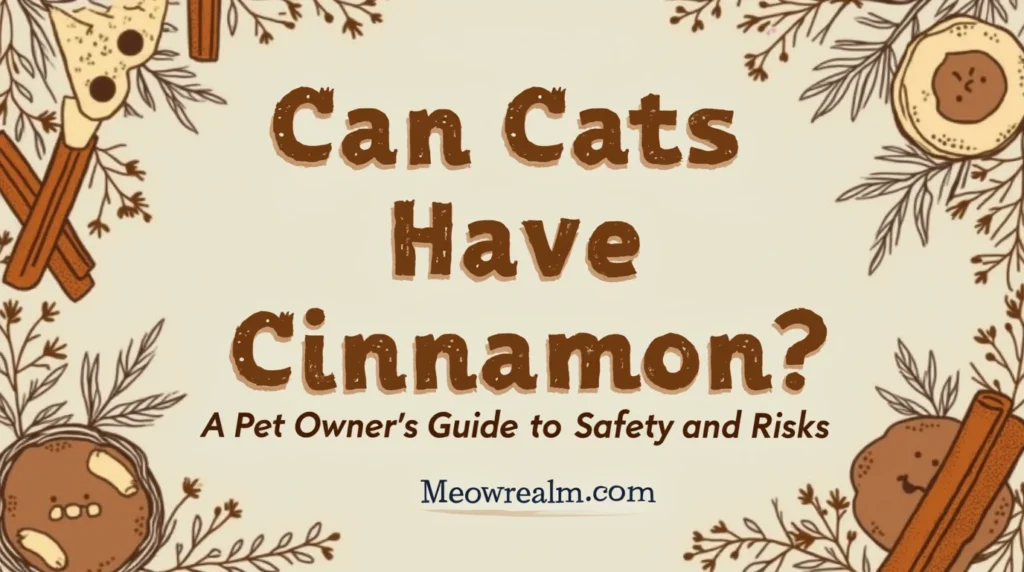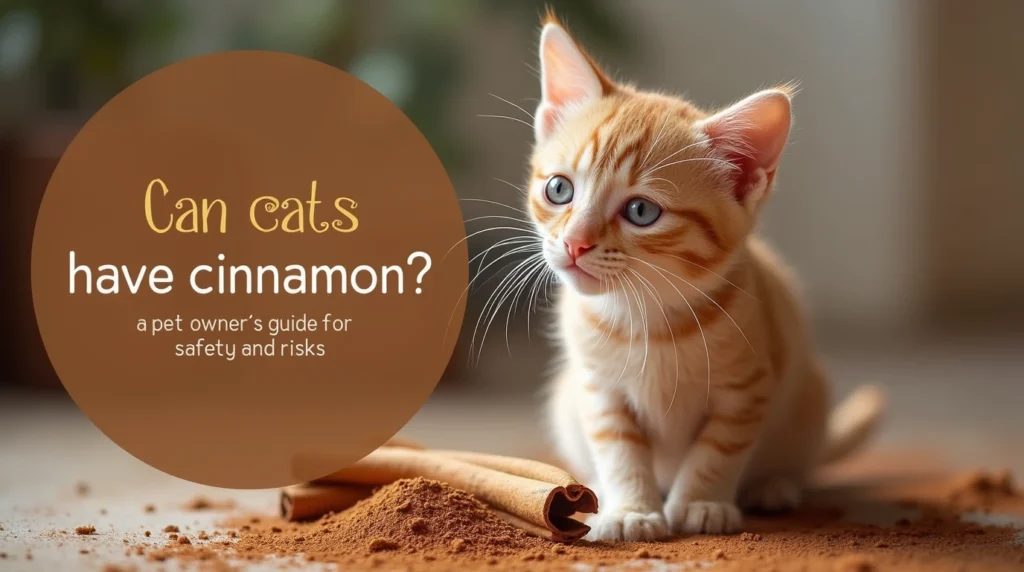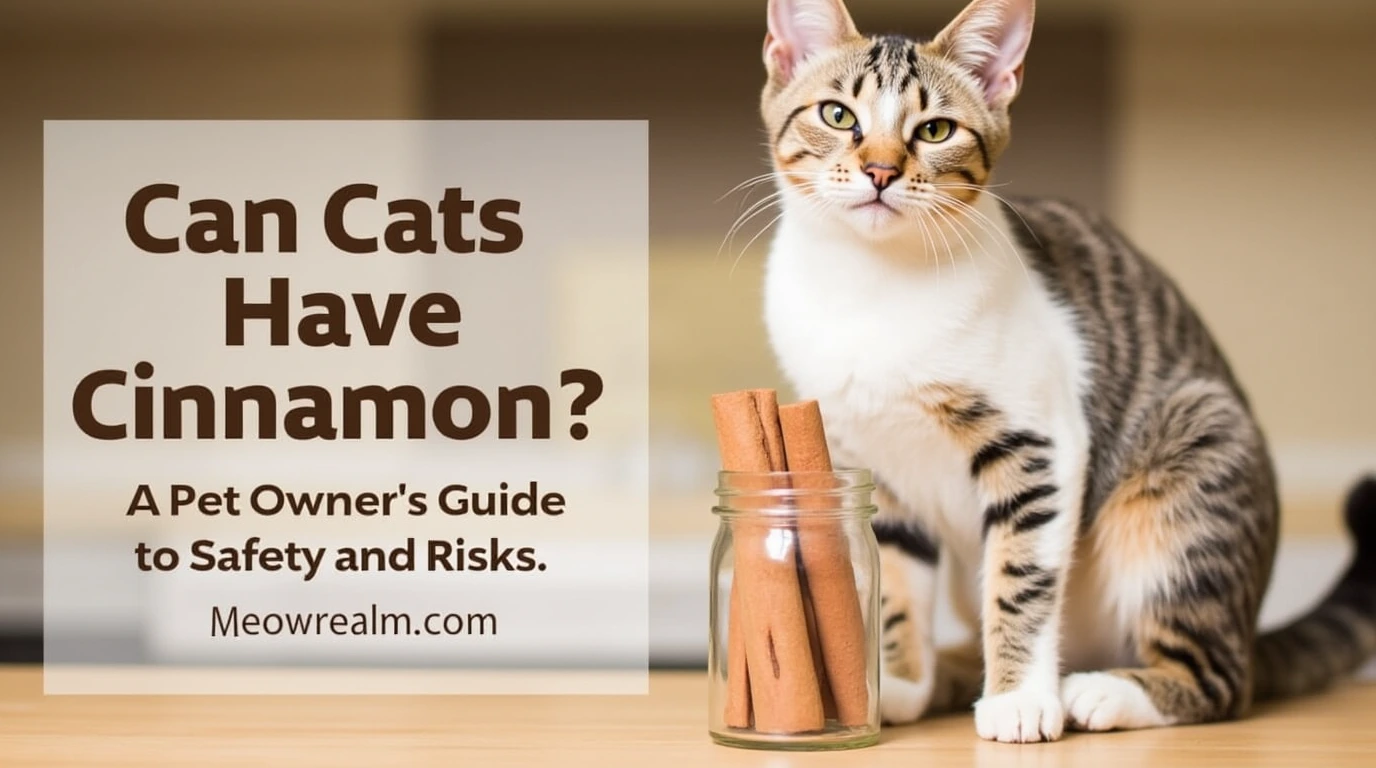can cats have cinnamon-The Temptation of Sharing Human Treats with Your Cat
Have you ever been baking in the kitchen, the warm scent of cinnamon filling the air, only to find your curious cat sniffing around? As a devoted pet owner, you might feel tempted to share your favorite human treats with your feline friend. But before you sprinkle a bit of cinnamon on your cat’s food, it’s crucial to understand whether this beloved spice is safe for cats. In this comprehensive guide, you’ll learn everything you need to know about cinnamon and its effects on your furry companion. By the end, you’ll have a clear understanding of how to keep your cat safe and healthy.
Table of Contents

What Is Cinnamon? can cats have cinnamon
Cinnamon is a popular spice that many people use in cooking and baking. Its sweet and warm aroma makes it a staple ingredient in kitchens around the world. But when it comes to your cat, you need to know what’s in cinnamon and how it can impact their health.
Types of Cinnamon
There are two main types of cinnamon that you might encounter in your kitchen:
- Cassia Cinnamon — This is the most commonly available type of cinnamon, often found in grocery stores.
- Ceylon Cinnamon — Known as “true cinnamon,” this variety is more expensive and has a milder flavor.
Both types of cinnamon contain compounds that can be harmful to your cat, particularly when consumed in large amounts.
Common Uses of Cinnamon in Human Diets
Cinnamon is used in a variety of ways in human diets, including:
- Baking and desserts (such as cinnamon rolls and cookies)
- Beverages (like cinnamon lattes and teas)
- Health supplements (for its anti-inflammatory and antioxidant properties)
While cinnamon may offer health benefits for humans, it’s essential to understand that your cat’s body processes it differently.
Can Cats Have Cinnamon? Understanding the Risks

The big question remains: Can cats have cinnamon? The short answer is no. While a small amount of cinnamon may not cause immediate harm, it’s best to avoid giving it to your cat altogether. Here’s why.
Why Cats Should Avoid Cinnamon
Unlike humans, cats lack certain liver enzymes that help process certain compounds found in cinnamon. This means their bodies cannot break down cinnamon efficiently, which can lead to health issues.
- Lack of liver enzymes — Cats do not have the necessary enzymes to metabolize cinnamon.
- Toxic components — Cinnamon contains coumarin, a compound that can be toxic to cats in large amounts.
Symptoms of Cinnamon Toxicity in Cats
If your cat ingests cinnamon, you need to be aware of the potential signs of toxicity. These symptoms can vary depending on how much cinnamon your cat consumed.
- Vomiting
- Diarrhea
- Coughing or difficulty breathing
- Low blood sugar levels
- Lethargy
- Mouth irritation
How Much Cinnamon Is Dangerous for Cats?
Even a small amount of cinnamon can be harmful to cats, particularly in powdered form or essential oils. For example:
- Powdered cinnamon — Can irritate your cat’s mouth and digestive system.
- Cinnamon essential oils — Highly concentrated and more dangerous. Avoid using essential oils around your cat.
Pros and Cons of Cinnamon for Cats
When considering whether to let your cat near cinnamon, it’s essential to weigh the pros and cons.
Pros -Can Cats Have Cinnamon
While there aren’t many benefits of cinnamon for cats, some pet owners use the spice in very controlled ways.
- Mild scent stimulation — Some cats may find the smell of cinnamon interesting. However, this should be limited to indirect exposure.
Cons -Can Cats Have Cinnamon
The risks far outweigh the potential benefits when it comes to cats and cinnamon.
- Toxic in large amounts — Cinnamon can cause serious health issues in cats.
- Essential oils are dangerous — Cinnamon oils can be highly concentrated and toxic.
Safe Alternatives to Cinnamon for Cats
Instead of giving your cat cinnamon, consider these safe alternatives to provide mental stimulation and treats.
Cat-Safe Herbs and Spices
There are a few herbs and spices that are safe for cats and can even provide health benefits.
- Catnip — A favorite among many cats, catnip can provide stimulation and relaxation.
- Valerian root — This herb can have a calming effect on some cats.
- Silver vine — Similar to catnip, silver vine is another safe option for cats.
Safe Human Foods for Cats
If you want to give your cat a treat, here are some safe human foods you can offer:
- Cooked chicken (plain, without seasoning)
- Plain pumpkin (great for digestion)
- Unsweetened yogurt (in small amounts)
What to Do If Your Cat Eats Cinnamon
If you suspect your cat has consumed cinnamon, it’s essential to act quickly.
Steps to Take Immediately
- Assess how much cinnamon your cat consumed.
- Look for symptoms of toxicity.
- Contact your veterinarian immediately.
Treatment Options
Your veterinarian may recommend the following treatments depending on the severity of your cat’s symptoms:
- Activated charcoal to absorb toxins
- Intravenous fluids to prevent dehydration
- Medications to treat specific symptoms
FAQ: Can Cats Have Cinnamon?
Is Cinnamon Safe for Cats to Smell?
Yes, smelling a small amount of cinnamon is generally safe, but avoid letting your cat inhale powdered cinnamon or essential oils.
Can Cats Eat Foods with Cinnamon in Them?
It’s best to avoid giving your cat any food containing cinnamon, especially baked goods that may also have sugar or other harmful ingredients.
Are Cinnamon Essential Oils Safe for Cats?
No, cinnamon essential oils are highly toxic to cats and should be kept away from them.
What Are the Signs of Cinnamon Toxicity in Cats?
Watch for symptoms like vomiting, diarrhea, coughing, and lethargy. If you notice any of these signs, contact your vet immediately.

Is Cinnamon Bad for Cats?
Yes, cinnamon can be harmful to cats if consumed in significant amounts. While a small exposure might not cause immediate harm, cinnamon contains compounds like coumarin that cats cannot process due to their lack of certain liver enzymes. This can lead to toxicity symptoms such as vomiting, diarrhea, coughing, or even more severe issues like low blood sugar and liver damage. Therefore, it’s best to avoid giving your cat any cinnamon or foods that contain it, keeping their diet safe and feline-friendly.
Is Cinnamon Toxic to Cats?
Yes, cinnamon can be toxic to cats, especially in large quantities or in concentrated forms like essential oils. Cats lack the enzymes needed to break down compounds in cinnamon, particularly coumarin, which can cause toxicity. Ingesting cinnamon may lead to symptoms such as vomiting, diarrhea, coughing, low blood sugar, and even liver damage. Cinnamon essential oil is especially dangerous due to its potency, and even inhaling it can cause respiratory issues for cats. To keep your feline safe, it’s best to keep cinnamon products out of reach and avoid using cinnamon-based air fresheners or essential oils around your pet.
Conclusion: Keep Cinnamon Out of Your Cat’s Diet
Cinnamon is a beloved spice for humans, but it’s not suitable for cats. The potential risks far outweigh any possible benefits. Instead, opt for cat-safe treats and herbs to keep your feline friend happy and healthy.
To keep your pet safe, always research new foods before offering them to your cat. Visit MeowRealm for more tips on keeping your cat healthy and happy. Don’t forget to share this article with fellow cat owners to spread the word and keep our feline friends safe!
can cats have cinnamon

